Filter by
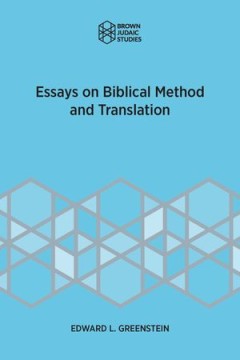
Essays on Biblical Method and Translation
This collection of essays deals with two interwoven themes. The first is a critical reflection on the often theoretical underpinnings biblical studies. The second engage theoretical reflections on translating the Bible. Together they show the need to bring theory and practice of biblical scholarship into closer relationship with each other.
- Edition
- -
- ISBN/ISSN
- 9781951498252
- Collation
- -
- Series Title
- -
- Call Number
- -
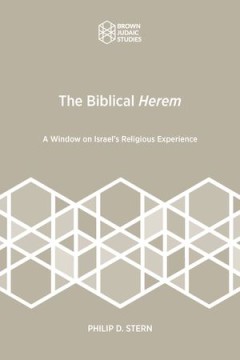
The Biblical Herem A Window on Israel’s Religious Experience
The Biblical Herem: A Window on Israel’s Religious Experience, was a groundbreaking, and controversial, examination of the herem, a biblical mode of declaring something (objects, people, cities) proscribed. Stern here reconstructs how the herem relates to other modes of thinking, in the Hebrew Bible and elsewhere in the Ancient Near East. The book contains a new preface by the author.
- Edition
- -
- ISBN/ISSN
- 9781951498665
- Collation
- -
- Series Title
- -
- Call Number
- -
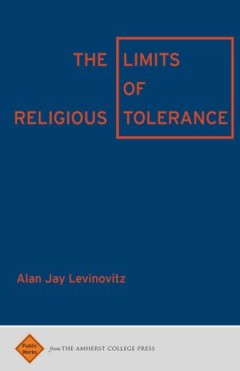
The Limits of Religious Tolerance
Religion’s place in American public life has never been fixed. As new communities have arrived, as old traditions have fractured and reformed, as cultural norms have been shaped by shifting economic structures and the advance of science, and as new faith traditions have expanded the range of religious confessions within America’s religious landscape, the claims posited by religious faiths�…
- Edition
- -
- ISBN/ISSN
- 9781943208050
- Collation
- -
- Series Title
- -
- Call Number
- -
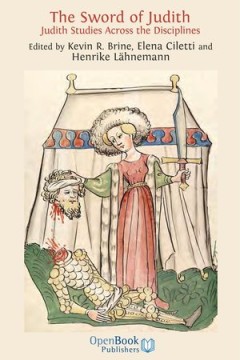
The Sword of Judith Judith Studies Across the Disciplines
The Sword of Judith is the first multidisciplinary collection of essays to discuss representations of Judith throughout the centuries. Bringing together scholars from around the world, it transforms our understanding of Judith’s enduring story across a wide range of disciplines. The book includes sections on Judith in Christian, Jewish and secular textual traditions, as well as representation…
- Edition
- -
- ISBN/ISSN
- 9781906924171
- Collation
- -
- Series Title
- -
- Call Number
- -

The Joseph Story between Egypt and Israel
Within the context of the Torah, the Joseph story can be read as a transition that explains why Jacob and his family came to Egypt. However, if one looks at other texts of the Hebrew Bible, there is no mention of the Joseph story; instead, the arrival of the Israelites is said to be the result of the decision of a "father" or of "fathers" to go down do Egypt. Indeed, there are very few referenc…
- Edition
- -
- ISBN/ISSN
- 9783161601545
- Collation
- -
- Series Title
- -
- Call Number
- -

The Interpretation of Freedom in the Letters of Paul
Wayne Coppins investigates the interpretation of freedom in Paul's letters with special reference to Martin Luther and twentieth-century "German" New Testament scholarship. He focuses on three key issues, namely the importance of freedom in Paul's letters and theology, the centrality and meaning of "freedom from the law," and the relationship between freedom and service. In addition to providin…
- Edition
- -
- ISBN/ISSN
- 9783161516047
- Collation
- -
- Series Title
- -
- Call Number
- -
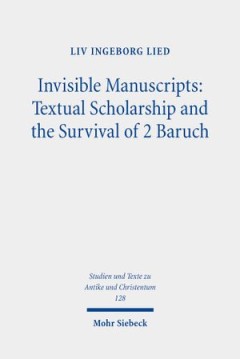
Invisible Manuscripts Textual Scholarship and the Survival of 2 Baruch
In this critical exploration of the role of manuscripts in textual scholarship, Liv Ingeborg Lied studies the Syriac manuscript transmission of 2 Baruch. These manuscripts emerge as salient sources to the long life of 2 Baruch among Syriac speaking Christians, not merely witnesses to an early Jewish text. Inspired by the perspective of New Philology, Lied addresses manuscript materiality and pa…
- Edition
- -
- ISBN/ISSN
- 9783161606731
- Collation
- -
- Series Title
- -
- Call Number
- -
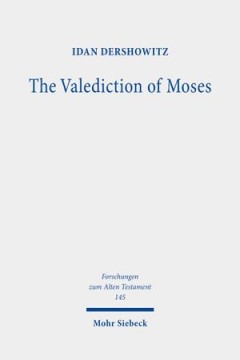
The Valediction of Moses A Proto-Biblical Book
Moses Wilhelm Shapira's infamous Deuteronomy fragments - long believed to be forgeries - are authentic ancient manuscripts, and they are of far greater significance than ever imagined. The literary work that these manuscripts preserve - which Idan Dershowitz calls "The Valediction of Moses" or "V" - is not based on the book of Deuteronomy. On the contrary, V is a much earlier version of Deutero…
- Edition
- -
- ISBN/ISSN
- 9783161606458
- Collation
- -
- Series Title
- -
- Call Number
- -
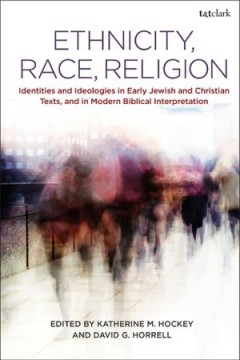
Ethnicity, Race, Religion Identities and Ideologies in Early Jewish and Chri…
Religion, ethnicity and race are facets of identity that have become increasingly contested. The modern discipline of biblical studies developed in the context of Western Europe, concurrent with the emergence of various racial and imperial ideologies. The essays in this volume deal both with historical facets of ethnicity and race in antiquity, in particular in relation to the identities of Jew…
- Edition
- -
- ISBN/ISSN
- 9780567677303
- Collation
- -
- Series Title
- -
- Call Number
- -
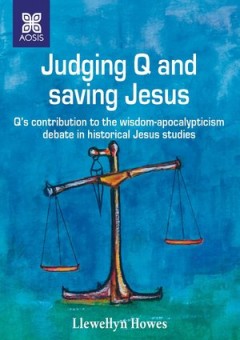
Judging Q and Saving Jesus Q’s Contribution to the Wisdom-Apocalypticism D…
The monograph Judging Q and Saving Jesus is characterised by careful textual analysis, showing a piercing critical eye in its impressive engagement with the secondary literature, and sharp and insightful critique. The target audience are specialists in the field of research on the Sayings Source Q (the hypothetical source of certain sayings of Jesus common to Matthew and Luke), historical Jesus…
- Edition
- -
- ISBN/ISSN
- 9780620687379
- Collation
- -
- Series Title
- -
- Call Number
- -
 Computer Science, Information & General Works
Computer Science, Information & General Works  Philosophy & Psychology
Philosophy & Psychology  Religion
Religion  Social Sciences
Social Sciences  Language
Language  Pure Science
Pure Science  Applied Sciences
Applied Sciences  Art & Recreation
Art & Recreation  Literature
Literature  History & Geography
History & Geography